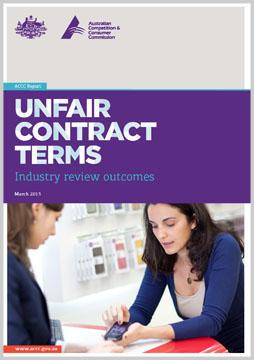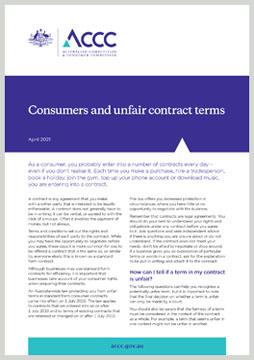On this page
About contracts
When an agreement forms a contract
When someone buys products or services, they enter into a contract with the seller.
A contract is an agreement made between 2 or more parties that is legally enforceable. Legally enforceable means if one of the parties breaks the contract, the other party can take legal action against them.
There is generally a contract whenever a seller makes an offer and a buyer accepts it.
The buyer can accept a contract:
- by signing a written document
- by saying they accept it
- through actions such as paying for a product or clicking ‘I agree’ on a website.
It’s illegal for businesses to force or pressure consumers or other businesses into entering a contract.
Terms and conditions in a contract
Written contracts have terms and conditions that set out the rights and responsibilities of each party.
When you buy a product or service, certain consumer rights always exist under the law, and the terms and conditions of a contract can’t take away these rights.
Make sure you read and understand the terms and conditions of a contract before you accept it. If you don’t understand the terms and conditions, talk to a lawyer.
Ending a contract
A consumer can generally end a contract with no charge if:
- the business has said anything false or misleading about the goods, services, terms or conditions
- a service has not met a consumer guarantee
- the consumer is in a cooling-off period.
A cooling-off period means a consumer can change their mind in a certain time period after buying something. Cooling-off periods are written into the terms of some contracts. Consumers have an automatic right to a cooling-off period when they buy goods or services through telemarketing or door-to-door sales.
Unfair contract terms
Laws protect consumers and small businesses from unfair terms in standard form contracts.
Changes to the law on unfair contract terms
Changes to the law on unfair contract terms came into effect on 9 November 2023.
From this date, proposing, using or relying on unfair contract terms in standard form contracts will be banned and penalties for breaches of the law will apply.
Other key changes relate to deciding whether a contract is a standard form contract and the definition of a small business contract.
The changes apply to:
- standard form contracts made or renewed on or after 9 November 2023
- a term of a contract that is varied or added on or after 9 November 2023.
Where a term of a contract is varied or added on or after 9 November 2023, the changes relevant to deciding whether a contract is a standard form contract apply to the whole contract.
About standard form contracts
Sometimes, a buyer and seller work out terms together before they agree to a contract. But often, a business will use a pre-written contract for all their customers, and the customer can’t change any, or the majority, of the terms of the contract. They can only take it or leave it. This is called a standard form contract.
There is a presumption that a contract is a standard form contract, so the party that prepared the contract must prove that it isn’t.
In deciding what a standard form contract is, a court will consider whether one of the parties to the contract:
- has all or most of the bargaining power in the transaction
- prepared the contract without or before any discussion between the parties about the transaction
- could effectively only either accept or reject the terms of the contract as presented
- was given any real opportunity to negotiate the terms of the contract
- whether the terms of the contract take into account any specific features of the other party or the transaction.
A court can also consider any other factors it thinks relevant.
Changes to the law on standard form contracts
A change to the law came into effect on 9 November 2023. This change gives more guidance on how to decide whether a contract is a standard form contract.
In addition to the existing factors, a court will also consider whether the party that prepared the contract has also made other contracts that are the same or very similar and the number of times this has been done.
The change to the law will also make clear that a contract may be a standard form contract despite:
- the other party having an opportunity to negotiate changes to terms of the contract that are minor or insubstantial in effect
- the other party being able to select a term from a range of options determined by the party that prepared the contract, or
- the party that prepared the contract letting a third party negotiate the terms of a different contract. This means that even if some consumers or small businesses are able to negotiate the terms of a contract that is issued to a broader group of consumers or small businesses, the contract may still be a standard form contract.
Types of terms that are or may be unfair
Contract terms are unfair if they:
- cause a significant imbalance in the rights and obligations of the parties under the contract
- are not reasonably necessary to protect the legitimate interests of the party who gets an advantage from the term, and
- would cause financial or other harm to the other party if enforced.
In deciding whether a term is unfair, a court can consider any matters it thinks relevant but it must consider the contract as a whole and whether the term is transparent.
The law sets out examples of terms that may be unfair, including:
- terms that allow one party (but not the other) to avoid or limit their responsibilities under the contract
- terms that allow one party (but not the other) to end the contract
- terms that penalise one party (but not the other) for breaching or ending the contract
- terms that allow one party (but not the other) to change the terms of the contract.
For information about unfair terms in contracts for financial products and services, such as loans and financial advice, contact ASIC, which regulates these types of contracts.
Example of an unfair contract term
Business A provides standard form 3 year contracts for broadband services. A term of Business A’s contract allows it to change the price for the services at any time during the 3 years. The customer is not allowed to end the contract, even if they don’t agree to the price increase.
Business B provides standard form 3 year contracts for broadband services. A term of Business B’s contract allows it to change the price for the services at any time during the 3 years. However, another term of Business B’s contract allows customers who don’t agree to a price increase to end the contract without any penalty.
The term that allows Business A to change prices during the contract term is likely to be an unfair contract term. However, the similar term in Business B’s contract is likely to not be an unfair contract term because the other term allowing early termination without penalty balances it.
When unfair contract terms law doesn't apply
The unfair contract terms law does not apply to:
- terms that are specifically required or permitted by another law
- terms that set out the upfront price to be paid
- terms that define the main subject matter of the contract
- company constitutions
- commercial contracts for the shipping of goods by sea.
How decisions on unfair contract terms are made
Only courts can make final decisions about whether a contract term is unfair.
In deciding whether a term is unfair, the court will consider all the rights and responsibilities for each party under the contract, as well as whether the term is transparent. A term is transparent if it is in reasonably plain language, clear, and not hidden.
The court will consider whether any other terms in a contract offset the potential unfairness of a term.
Effect of having an unfair contract term
If a court decides that a term is unfair, it will be ‘ void’. This means it will no longer apply to the parties to the contract.
If the rest of the contract can continue without that term, then rest of the contract will continue to apply to the parties.
Small business and unfair contract terms
Small businesses are protected from unfair terms in standard form contracts for products, services or land transactions if:
- they have 20 or fewer employees
- the upfront price payable is under $300,000, or $1 million for contracts lasting more than 12 months.
Employees are counted by:
- considering the number at the time the contract is agreed
- including any casual employees if they are employed on a regular and systemic basis
- not including the employees of any related business entities.
Changes to the law
A change to the law came into effect on 9 November 2023 that will replace the above thresholds. Small businesses will be covered by the unfair contract terms protections for any new or varied standard form contract from that date if they:
- have fewer than 100 employees, or
- make less than $10 million in annual turnover.
Businesses using standard form contracts should make enquiries to work out whether their customers will fall under these thresholds. If in doubt, it may be safest for the business to assume their customers will.
The upfront price payable includes any payments for the product or service being supplied under the contract, which are disclosed when the contract is agreed. This includes any payments that are required if certain things happen under the contract. However it does not include any amounts that can’t be worked out at the time the contract is agreed.
We have guides to help small business work out whether contract terms might be unfair.
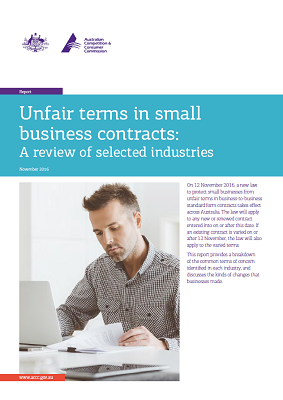
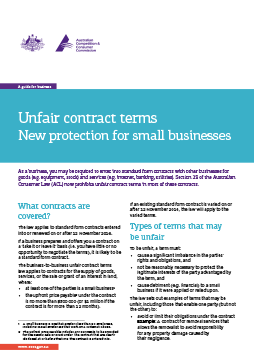
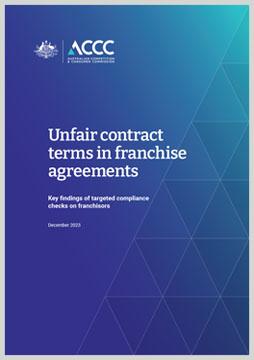
Consumers and unfair contract terms
We have guides to help consumers work out whether contract terms may be unfair.
